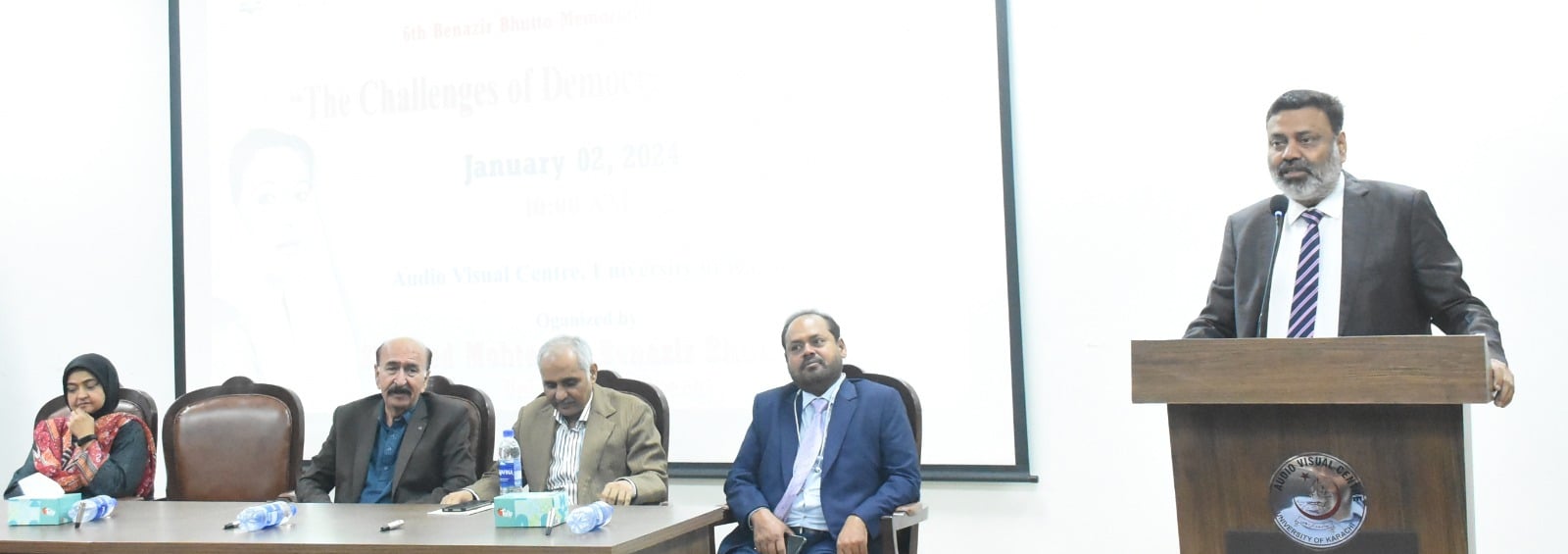'No democracy thrives in any tribal, feudal society'
Panel of experts at University of Karachi discusses challenges that Pakistan's democracy faces
A panel of experts at Karachi University (KU) on Tuesday discussed the challenges that Pakistan’s fragile democracy faces as the general elections are all set to take place on February 8
The Shaheed Mohtarma Benazir Bhutto (SMBB) Chair of the UoK organised the sixth Benazir Bhutto Memorial Lecture on “The Challenges of Democracy in Pakistan” on Tuesday.
Professor Dr Riaz Ahmed Shaikh, Dean of the Faculty of Social Sciences and Education Shaheed Zulfikar Ali Bhutto Institute of Science and Technology Karachi, said that no democracy thrives in any tribal and feudal society.
The seeds of democracy are found in a society that has industrialisation, human compassion, and human rights, he said.
He mentioned that Pakistani society is still divided based on tribalism and feudalism and the biggest danger is extremism which has created more cracks in our society.
“In such a scenario, democracy would always remain weak in the country.”
Professor Dr Shaikh observed that universities are one of the major platforms that help in promoting democratic values and its process in society and the culture of discussion is essential in this regard.
Another speaker, renowned journalist Nazir Laghari said that the separation of the then East Pakistan was not a political mistake but it was separated deliberately.
“The military dictatorship has always played with the constitutions of the country and surpassed the democratic governments for their gain,” the journalist said.
He informed the audience that the opposite of democracy is dictatorship and Pakistani democracy has always been under attack.
Laghari shared that the public’s interest was among the priorities of the past governments but after a few years of the creation of our motherland, these preferences have dwindled and are now almost gone.
Meanwhile, KU Vice Chancellor Professor Dr Khalid Mahmood Iraqi said that the middle class is not visible in Pakistani politics, while in America, Britain, India, and other Western countries, the middle class is a part of politics and they have access to the assemblies.
The presence of the middle class in the assemblies is a sign of political stability, he noted.
“One of the reasons for the development of our neighbouring country India is the abolition of feudalism through agricultural reforms, while Pakistan still seems incapable of getting rid of feudalism.”
The KU VC observed that a scene of accountability and responsibility is lacking within our system and is one of the major causes of our weak democratic and political setups.
On this occasion, KU Dean of the Faculty of Arts and Social Sciences Professor Dr Shaista Tabsum said that one of the reasons for the failure of the democratic system in Pakistan is the undemocratic nature of political parties.
She observed that the political elites and masses have no direct connection and the leadership will meet with the public during election campaigns and a couple of other occasions.
Tabusm advised that if people want political reforms in the country, then they have to promote education and create awareness regarding the rights of the citizens.
“Along with this, there is a need for reforms in political parties as well.”
-
Security forces gun down 30 terrorists in multiple IBOs in KP: ISPR
-
MQM-P calls for new province in Sindh
-
US report validates Pakistan military edge over India: PM
-
Banned TTP poses serious threat to Pakistan security: UNSC panel
-
CM Afridi clarifies remarks on by-poll after ECP requests army deployment
-
Dubai sees 3.2m Pakistani passengers in 2025 as airport sets new milestone
-
Security forces kill 23 Indian proxy terrorists in KP's Kurram
-
Pakistan to construct island to boost oil exploration: report













